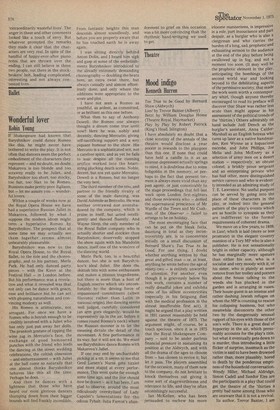Ballet
Wonderful lover
Robin Young
If Shakespeare had known that Baryshnikov could dance Romeo like this, he might never have bothered to write the play. It is not often that dancers seem the perfect embodiment of the characters they represent — and no doubt, no doubt Makarova is too blonde and too scrawny really to be Juliet, and Baryshnikov too short, too stocky, too fair, too Slav to be Romeo. Russians make pretty poor 14lians, but — let me assure you — wonderful lovers.
Within a couple of weeks now at the Royal Opera House we have had a superlative Russian Juliet in Makarova, followed by what I suppose the modern idiom might term a hyperlative Romeo by Baryshnikov. The prospect that at some time we may actually see them together seems almost unbearably pleasurable.
Baryshnikov was new to the Royal Opera House, to the Royal Ballet, to the role and the choreography, and to his partner, Merle Park. He had only danced party pieces — with the Kirov at the Festival Hall — in London before. But his performance was a revelation and what it revealed was that not only can he dance with grace, ease and brilliance but he can act with pleasing naturalness and convincing modesty as well.
His Romeo is aristocratic, not arrogant. For once we have a Romeo who is boyish enough to be credibly involved with a Juliet who has only just put away her dolls. The prankish gesture of tipping the wine jug in Mercutio's face, the exchange of good humoured punches With the friend who leads the dancing at the street wedding celebrations, the coltish obsession — and embarrassment — with Juliet at the ball come so naturally that one almost thinks Baryshnikov behaves like this all the time. Perhaps he does.
And then he dances with a lightness that those who have heard our most glorious dancers thumping down from their bigger bounds will find frankly incredible. From fantastic heights this man descends almost soundlessly, and before you are properly aware that he has touched earth he is away again.
I was sitting directly behind Anton Dolin, and I heard him sigh and gasp at some of the embellishments Baryshnikov introduced to the already extremely demanding choreography — doubling the beats here, an extra twist there, but always casually and almost effortlessly done, and only where the additions were appropriate to the score and plot.
I have not seen a Romeo as youthful, as ardent, as committed, or as brilliant as this one before.
What then to say of Anthony Dowell, the Romeo one always thought a dream come true until now? Here he was, nobly and decently, dancing Mercutio, giving self-sacrificing support and a wry piquant humour to the show. His Mercutio is a sophisticated wit, not a carefree spirit, and as yet he fails to soar despite all the cunning artifice worked into the heartstring plucking death scene. Noble, decent, but. not yet quite Mercutio. Dowell is a Romeo, but no longer the very best.
The third member of the trio, and partner to the friendly rivalry of some of the male dancing, was David Ashmole as Benvolio. He was neither overawed nor overshadowed by the company, which is praise in itself, but acted intelligently and danced fluently. And Wayne Sleep, the only member of the Royal Ballet company who is actually shorter and stockier than Baryshnikov, deservedly stopped the show again with his Mandolin dance, itself one of the wonders of the dancing world.
Merle Park, too, is a bea,.itiful dancer, but she is not Baryshnikov's ideal Juliet. She does th. skittish bits with some enthusiasm and makes a piteous tragedienne, but there is more than a hint of English reserve which sits uncomfortably by the driving force of impassioned commitment (albeit Slavonic rather than Latin in national origin). Her dancing seems well judged, carefully considered (an arm goes elegantly, would-be expressively up in the air, before it comes round Romeo's neck) where the Russian manner is tO let the meaning dictate the detail of the movement. A fine performance in its way, but it will not do. We must see Baryshnikov dance Romeo with Makarova's Juliet.
If one may end by uncharitably picking at a nit, it seems to me that Gerd Larsen's Nurse gets tizzier and more stupid at every performance. This went quite far enough some time ago, and the line should now be drawn — as it has been, I am glad to observe, around the most ridiculously overstylised of Lady Capulet's lamentations for the odious Tybalt. Julia Farron's aban
donment to grief on this occasion was a bit more convincing than the rhythmic hand-wringing we used to get.
































 Previous page
Previous page